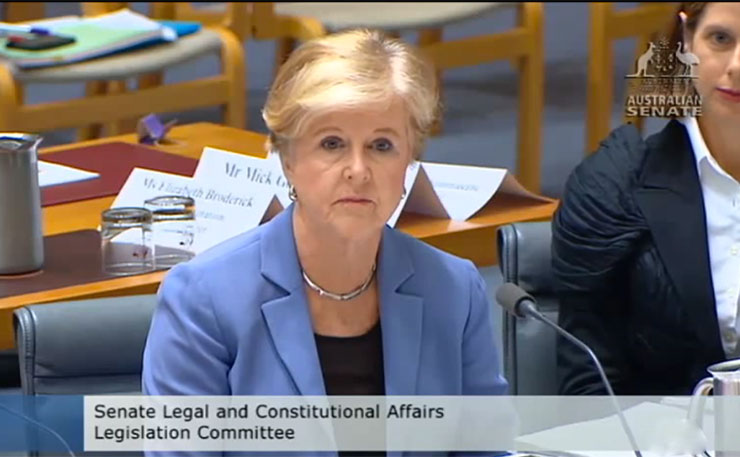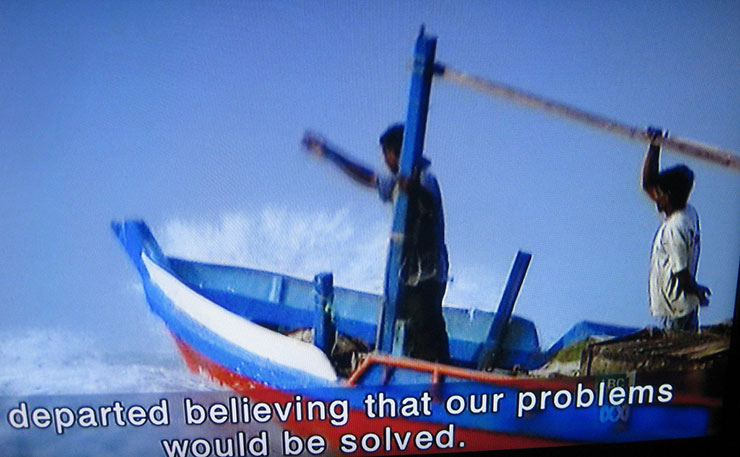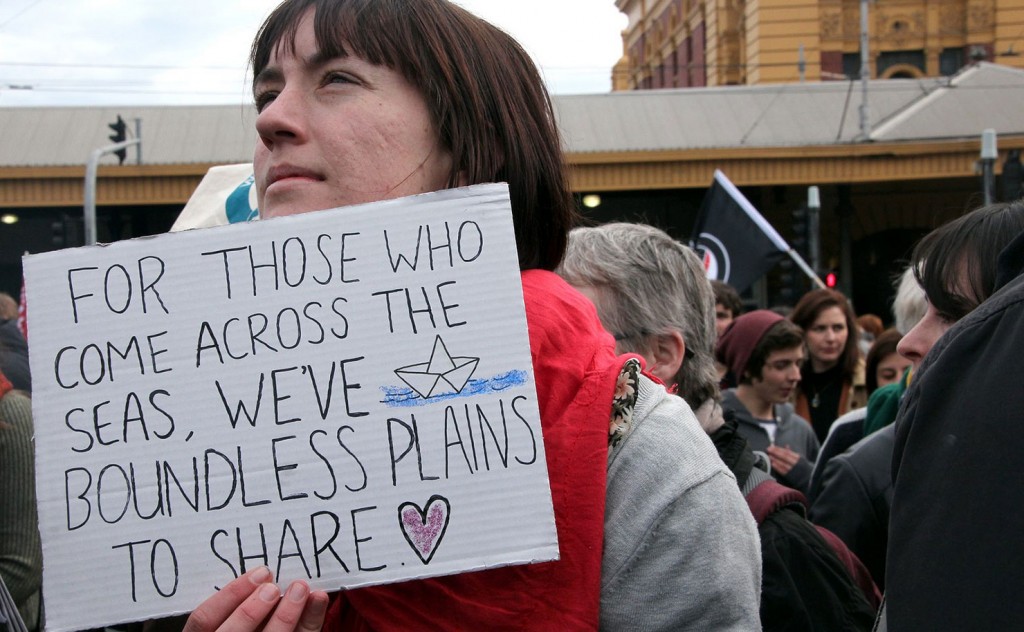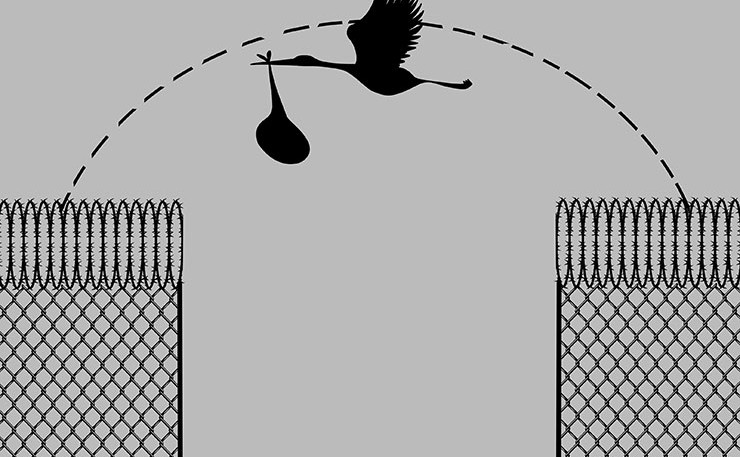Ben Eltham weighs in on the latest Australian outrage being perpetrated against some of the world’s most vulnerable people.
What can you say about the mess that is asylum seeker policy in Australia?
After years of covering the issue for New Matilda, I find myself in a similar position to the Guardian’s cartoonist First Dog on the Moon, who scribbled yesterday that “I’m not sure I can do this anymore.”
For those of us who oppose the torture of children (did I just write that? Yes, yes I did) these are dark times. Our public debate has become so debauched that it now seems possible that the government of our nation will deport babies born in this country – who should be Australian citizens – to a foreign hell-hole where sexual abuse is rife, and where we know that indefinite detention is akin to torture.
That is the seemingly inevitable result of yesterday’s decision by the High Court of Australia, after it ruled on the most recent test case concerning the constitutionality of current Australian immigration and border protection laws.
The effect of the decision is to uphold the government’s punitive and despotic regime of offshore immigration detention. Amazingly, it also upholds the political fiction that the nation detaining these benighted individuals is the government of Nauru, rather than the government of Australia.
As Michael Bradley points out today on the ABC’s Drum website, the High Court’s majority decision legally entrenches the twisted logic of Australia’s system of immigration gulags, in which we try to pretend that a nation of 10,000 souls with no functioning economy and little respect for the rule of law is somehow responsible for the people Australia sent to the jail Australia constructed and funded. It might be defensible in the black letter of the law, but in practical terms it is a farce.
For the asylum seekers themselves, it is a tragedy.

As the Human Rights Commission found in its report into children in immigration detention, The Forgotten Children, Nauru is a living hell in which rape and sexual abuse are widespread. Suicide and attempt suicides are prevalent. Self-harm is common. Elsewhere in our offshore gulag, a man has been murdered on Manus Island.
And why are we doing it? To “stop the boats”, of course.
As Prime Minister Malcolm Turnbull said in Parliament yesterday, “the people smugglers will not prevail over our sovereignty.”
“Our borders are secure,” Turnbull blustered. “The line has to be drawn somewhere and it is drawn at our border.”
If we let the babies stay… well, who knows what will happen? That can only encourage the dastardly people smugglers. And we cannot let the people smugglers win.
Let’s remind ourselves that these asylum seekers are innocent of any crime. It is not illegal to seek asylum on Australian shores, despite the tortuous legal chicanery of several federal governments since 2001. Most of those who have reached Australia via the admittedly dangerous voyage to Christmas Island have eventually been found to be valid refugees, and resettled in this country.
As we’ve argued many times at New Matilda, the current system of offshore detention is in effect a form of collective punishment to act as a deterrent against those seeking asylum here. The aim of the system is – quite transparently – to make things as miserable as possible, in order to deter anyone from trying to reach our shores by boat.
In a twisted corruption of utilitarian thinking, this is justified because it will supposedly stop people drowning at sea.
It is generally agreed that perhaps a thousand or more people died attempting to reach Australia by boat, particularly between 2008 and 2011. That was a human tragedy that we should neither deny nor dismiss. Of course the government should do everything in its powers to prevent such a tragedy from re-occurring.
But, as lawyer and academic Sarah Joseph has argued in a 2015 speech, if we’re going to make public policy on the basis of preventing human death and misery, then we must also focus on the other aspects of human death and misery inherently involved in the process of seeking asylum.
Asylum seekers are overwhelmingly fleeing places of war and political violence because they are in fear of their lives. Many are dying well before they ever cross their own borders, let alone before they set out for Australia on a boat. And some are dying on boats as a result of regional policies preventing their entry, like the many Rohingyas that perished on board boats in the waters to our north in May 2015, after Malaysia and Indonesia refused to accept them.

Some asylum seekers have also died after Australia’s border protection forces put them in orange life-rafts and towed them back towards Indonesia.
Even if we accept that the current policy is saving lives by stopping some refugees from travelling to Australia by sea, it cannot in any meaningful sense be said to be preventing refugee deaths globally. There are more than 60 million refugees world-wide. As Joseph wrote last year, “our current policy is the ultimate case of NIMBY. Leave it to the rest of the world to cope with this problem.”
But the real problem here is moral, not practical. Quite simply, Australia’s current border protection policies are morally indefensible.
Let me write this very plainly. The fact that people drowned while seeking asylum on our shores cannot in any way justify our current policy.
To argue that torturing children is justified because it stops drownings at sea is a kind of monstrous utilitarianism that violates every precept of a liberal and democratic society.
Thousands of Australians die from smoking-related illnesses every year. We don’t send the children of smokers to a jail on a Pacific island, where we know they could be raped and abused.
Alcohol-related illnesses kill more than 5,000 Australians every year. We don’t lock up the children of alcoholics in a special jail.
Approximately 1,150 Australians died in car crashes last year. We haven’t created an island prison for the children of dangerous drivers.
Such measures would certainly deter more Australians from smoking, drinking and driving dangerously. They would also be unjust and cruel. That is because they would be a form of collective punishment – punishment of innocents, on account of the acts of others.

(IMAGE: Takver, Flickr)
There is a reason that collective punishments are outlawed by more than a century of international law. As long ago as 1899, Article 50 of the first Hague Convention determined that “no general penalty, pecuniary or otherwise, can be inflicted on the population on account of the acts of individuals for which it cannot be regarded as collectively responsible”.
The “drownings” argument has been an effective weapon for politicians seeking to exploit community fear and prejudice for political gain. It has been so effective that it has banished any semblance of sensitivity, nuance or even sanity in the immigration debate.
This is how we’ve ended up in the bizarre situation where babies born in Australia to mothers who arrived here by boat are about to be sent to Nauru to ensure the sanctity of Australia’s borders.
There can be no justification for such a policy. Anyone advocating for it is accepting the punishment of innocents and the torture of children.
Shame on them, and on us.
Donate To New Matilda
New Matilda is a small, independent media outlet. We survive through reader contributions, and never losing a lawsuit. If you got something from this article, giving something back helps us to continue speaking truth to power. Every little bit counts.





